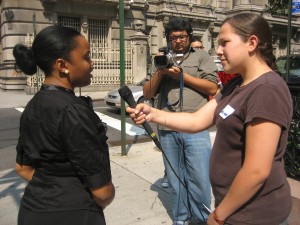 Why Interview? |
 Interview Types |
 Interview Tools |
 Interview Ethics |
 Test Your ‘IQ’ |
 Resources |
Interview Types
What do you want and how do you get it?
Interviews are hardly one-size-fits-all. They can be formal or informal, a quick confirmation or a long conversation. This chapter presents 10 types of interviews — some of which you may not  have considered interviews at all — to show you how versatile the tool can be.
have considered interviews at all — to show you how versatile the tool can be.
Even if you don’t have time to do a formal, sit-down interview, this chapter provides advice on using interviews to get information, incorporate other perspectives and double-check information.
Meghan McDermott of Global Action Project, a New York City youth media arts organization, tells aspiring citizen journalists to interview themselves first about what they want:
- What is it that you know?
- Who are the people who know about this topic?
- Who are the people who have different viewpoints about the topic?
- What is it that you want to know?
- Why is what you’re asking important to the community?
- What is it that other people need to know?
- Is your interview a dialogue, or are you probing for something specific?
These questions can help you determine whom to interview, what approach to take and what type of interview to conduct, says McDermott, executive director of the project, which teaches students to produce videos that address social-justice issues in their lives and neighborhoods.
What kind of interview do you use?
Here are the 10 types of interviews journalists use most often, including some sample scripts you could follow.
- Newsgathering Interview — To collect facts or history about a subject, either for a story or in preparation for another interview.
- Confirmation Interview — To check the validity of a report or a rumor or to get a second source on an important piece of information.
- Reaction Interview — To gather reaction or responses to breaking news.
- Person-on-the-street Interview — To seek input from diverse members of a community.
- Experts Interview — To add the expertise of a knowledgeable source to your story.
- Balance Interview — To show the many facets of a story by getting multiple viewpoints.
- Q & A Interview — To present the information in a question and answer format.
- Advance Interview — To gather information and write about an upcoming event, author or celebrity.
- In-depth Interview — To engage in a long form, conversation for a profile feature story or an enterprise story.
- Gotcha Interview — To confront a subject, often with incriminating or embarrassing information.
